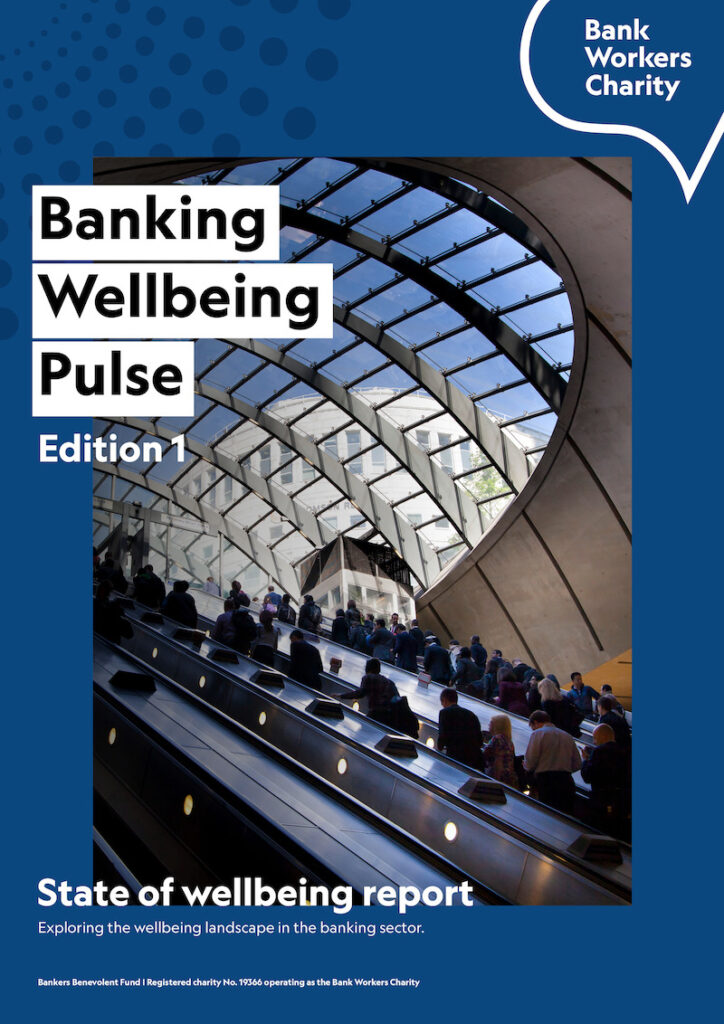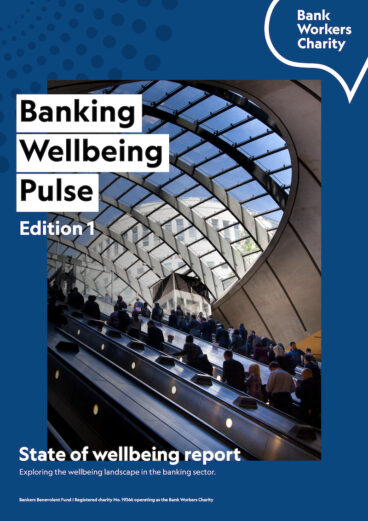Innovative wellbeing initiatives in the banking sector
5 April 2024
UK banks have long been at the forefront of best practice in workplace wellbeing. Our charity works closely with them to support their evolving wellbeing agendas. As a consequence, we’ve been able to enjoy something of a helicopter view of how wellbeing has developed across the sector. We’ve seen it gain momentum year on year, until it has become a business priority everywhere.
Banks at the forefront of wellbeing
Banks were among the first UK corporations to shift from offering a motley array of wellbeing programmes, managed by different parts of the business, to taking a structured approach where responsibility for wellbeing is vested in a particular department, usually HR. Banks were also among the first UK businesses to develop wellbeing strategies, a vital step in embedding wellbeing within the organisational culture. Looking across the sector today, we see an astonishing diversity of programmes in place, that testify to the quality of insight and intelligence that is driving the wellbeing agenda. And the fact that each bank has its own highly individual wellbeing strategy, driven by internal research, goes a long way to explain the sheer variety of approaches we’re seeing.
In this section, we want to highlight some of the most innovative and effective initiatives we’ve encountered, that will hopefully act as an inspiration for businesses in other sectors that are yet to fully develop their wellbeing agendas, inspiring them to push the boundaries too. The sheer variety of initiatives within banking tells its own story but we have chosen three different examples, each ground-breaking in its own way, to give a sense of how the sector is extending the wellbeing agenda into new areas and in new ways.
NatWest – Just Ask A Question, digital mental health platform
NatWest Group launched Just Ask A Question (JAAQ) , a mental health social media platform, in July 2023. JAAQ is a remarkable resource that allows employees to explore concerns across the entire spectrum of mental health issues. The content is engaging as well as highly credible, drawing on video contributions from leading experts in their fields. The platform is easy to use, allowing the user to ask questions around a plethora of issues, like anxiety, depression, men’s health and eating disorders. They can do so with complete confidence in the accuracy and currency of the responses, coming as they do from world experts, clinicians, and people with lived experience.
With some people still reluctant to talk about or seek help with mental health issues, JAAQ provides an easily accessible means of obtaining reliable information without having to speak to anyone. It’s a fantastic repository of mental health content and it’s growing all the time as new subjects get added and new experts make their contributions. The platform is highly engaging and can be accessed at the user’s convenience, by mobile or computer. It’s especially effective for those that like to assimilate new information visually and the fact that so much of it is communicated verbally, via the experts, makes it particularly easy to absorb. It’s also a great source of tips and tools, with breathing exercises, yoga, guided meditations and desk exercises, just some of the resources that can be accessed.
Already it has become a wellbeing fixture at the bank and has a huge reach. This has been facilitated with the support of 80 JAAQ brand ambassadors, who have been promoting the platform within different business units.
Over 14,000 questions have been asked of JAAQ since it’s July launch
- Results from NatWest’s JAAQ initiative
The platform has also proved its value to the wellbeing team in an unexpected way. When they checked for trending issues between July and September, the most searched for theme was burnout. Knowing this allowed them to focus on burnout as the centrepiece of their internal campaign for World Mental Health Day and they were able to host a bank-wide webinar on the subject, as well as provide an educational pack and slide deck for the bank’s cohort of wellbeing champions.

TSB – Carer policy
Carers UK estimate that over a quarter (26%), of all employees juggle work and care. And with an ageing population, the number of carers is only going to grow. The height of the pandemic represented a nadir in the life of many working carers. Vital amenities like day centres, that they rely on to gain some respite from their caring responsibilities, closed – often never reopening.
The threat of the virus, in combination with the lockdowns, the demands of their caring role and their busy jobs, put carers under unprecedented strain. Yet amidst all of these pressures, one thing changed for the better. There was an attitudinal shift in the workplace towards carers, as video calls during lockdown provided a window into the complex lives so many carers lead. And, as a consequence, many business leaders and managers now view carers more sympathetically and some employers have taken steps to make the workplace a more supportive environment for them.
34
of carers found that their employer had become much more understanding of caring during the pandemic
Still, there remains a long way to go with only 37% of employers having a carer policy in place.
One employer that has gone much further than most is TSB Bank. TSB launched its carer policy during National Carers Week in 2020. As with all the best wellbeing initiatives, this was built upon a significant amount of internal research. Through it, they were able to establish that around 10% of their staff had caring responsibilities and they were able to gauge what support would be most valued by colleagues.
The result was a generous policy that allows employees up to 70-hours paid leave a year, to help employees find a balance between work and caring. At the same time, the bank introduced a carer’s passport that maps out an employee’s caring responsibilities and how these responsibilities impact their lives. This enables the employee to work closely with their manager to address their needs as a carer.
Three years down the line, it’s possible to reflect on the impact that the policy has had across the bank. By November 2023, around one in ten staff had used just under 7,000 hours of paid carers leave since the policy launch; the relatively small numbers indicating that employees are using it very responsibly and taking it only when it’s needed. The bank hasn’t viewed the policy in isolation and has actively promoted other resources, internal and external, that are there to support carers, such as their Employee Assistance Programme, the legal and financial assistance available through their partnership with BUPA and the Bank Workers Charity who administer a fund on behalf of the bank, that can be drawn on by employees.
One key goal of the bank’s approach is to break through the stigma that makes carers in many organisations uncomfortable about talking about their caring responsibilities – for fear of receiving an unsympathetic response. By promoting their support for carers so visibly across TSB and by publicly championing the carer’s cause, through its role as a Carers Confident Ambassador, the bank is creating a culture where employees will feel encouraged to talk about themselves as a carer and to seek help and support when they need it. It’s also consistent with the bank’s wider “responsible business” agenda, captured in its “Do what matters plan”, for which inclusivity is a key driver.

UBS – Dementia support
Dementia mainly affects people over the age of 65 – in fact 1 in 14 people in this age group are affected. But when we look at those over the age of 80, that figure jumps to one in six. So, dementia, whilst not inevitable, is widespread. And though the numbers of people with dementia in the workplace will be low, the numbers who are carers of someone with dementia are considerable. With an ageing population, those numbers are on an upward curve. This level of prevalence means we probably all know someone affected by it.
By 2040 it’s estimated 1.6m people will be living with the condition
- A report commissioned by Alzheimer’s Society in 2019
UBS is a bank that is doing more than most to address the impact of dementia on their people. The bank has a relationship/partnership with Dementia UK with whom they have run masterclass clinics for staff, delivered by Admiral nurses who specialise in dementia. The clinics cover key issues that carers may encounter in their caring. The bank also ran a very well received webinar for staff and clients, delivered by dementia expert, Wendy Mitchell. They set up employee-led ‘coffee corners’ to provide an informal forum, in which colleagues can share their experience of dementia. These popular sessions have explored issues like behavioural problems among dementia sufferers, malnutrition, care homes and lasting power of attorney.
An internal SharePoint has also been created and this is kept current. It is an invaluable resource for dementia carers and houses a wide range of content from accredited sources, information about up-and-coming events, as well as recommended reading. The bank also ran a series of more generally relevant carers webinars that focused on issues such as the importance of self- care and on how to elicit support from your line manager.
One of the most important developments in the evolution of workplace wellbeing is the recognition that different demographics within the workforce have their own niche needs. People affected by dementia are one such group and the personal resources required to be a dementia carer, whilst holding down a demanding job, are very significant. The more that businesses like UBS can do to facilitate the sharing of key information and to create a supportive workplace environment, the easier it will be for these carers to manage their competing demands and protect their own wellbeing.

The future
This section of the report has highlighted some outstanding wellbeing initiatives from UK banks. Our charity believes that one of the most effective ways to create a healthy workplace culture in the UK is to raise awareness of best practice. Banks continue to innovate in the wellbeing field, so future iterations of this report will continue to spotlight some of the ground-breaking initiatives we’ve encountered in our work across the sector.
Next up in this edition…



